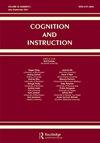When Linguistic Elements Contribute to Conceptual Dynamics: The Case of Chinese Students’ Pre-instructional Ideas About the Earth
IF 2.6
1区 心理学
Q2 PSYCHOLOGY, EDUCATIONAL
引用次数: 0
Abstract
Abstract In this study, we explore how cross-linguistic differences can contribute to children’s scientific thinking. We compared first and third grade Chinese students’ pre-instructional ideas of the earth expressed in clinical interviews with that of their English-speaking and Greek-speaking counterparts (as recorded in the literature). Inspired by a “Complex Dynamic Systems” (CDS) theoretical perspective on cognition and by the literature on “linguistic relativity” we hypothesized that in cases when two language systems offer greatly different linguistic elements, differences can be expected in how these elements interact with other types of conceptual elements. Consequently, such changes in dynamics may lead to variations in system-level conceptual structures emerging from native speakers of different languages. Our findings showed that (1) Chinese students held no flat or dual earth type of pre-instructional ideas about the earth; (2) Chinese students provided significantly more sphere-based responses than their American and Greek counterparts when responding to questions directly addressing the shape of the earth; (3) such cross-linguistic differences largely vanished for questions not directly getting at the shape of the earth, resulting in high frequency of inconsistency when responses to all the interview questions were interpreted as a whole. We discuss the significance and possible implications of these results for research on cross-cultural conceptual development and for teaching and learning science.当语言因素对概念动力起作用时——以中国学生对地球的教学前观念为例
摘要在本研究中,我们探讨了跨语言差异如何有助于儿童的科学思维。我们比较了一年级和三年级中国学生在临床访谈中表达的对地球的教学前想法与他们的英语和希腊语同行(如文献中所记录的)。受“复杂动态系统”(CDS)认知理论视角和“语言相对性”文献的启发,我们假设,在两个语言系统提供截然不同的语言元素的情况下,这些元素与其他类型的概念元素的互动方式可能会有所不同。因此,这种动态变化可能会导致不同语言的母语者出现系统级概念结构的变化。我们的研究结果表明:(1)中国学生对地球的预教学思想不具有“平地”或“对偶地”的概念;(2) 在回答直接涉及地球形状的问题时,中国学生比美国和希腊学生提供了更多基于球体的回答;(3) 这种跨语言的差异在很大程度上消失了,因为问题不是直接针对地球的形状,导致当对所有面试问题的回答都被解释为一个整体时,不一致的频率很高。我们讨论了这些结果对跨文化概念发展研究和科学教学的意义和可能的启示。
本文章由计算机程序翻译,如有差异,请以英文原文为准。
求助全文
约1分钟内获得全文
求助全文
来源期刊

Cognition and Instruction
Multiple-
CiteScore
7.90
自引率
12.10%
发文量
22
期刊介绍:
Among education journals, Cognition and Instruction"s distinctive niche is rigorous study of foundational issues concerning the mental, socio-cultural, and mediational processes and conditions of learning and intellectual competence. For these purposes, both “cognition” and “instruction” must be interpreted broadly. The journal preferentially attends to the “how” of learning and intellectual practices. A balance of well-reasoned theory and careful and reflective empirical technique is typical.
 求助内容:
求助内容: 应助结果提醒方式:
应助结果提醒方式:


